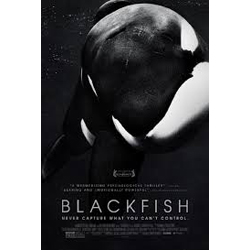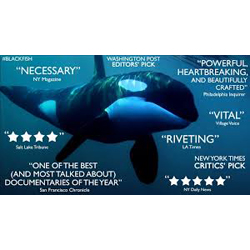 Released: 2013
Released: 2013
Director: Gabriela Cowperthwaite
A heart-breaking look at the horrors of captivity

As you’ll know if you follow me on Twitter, I’m passionate about animal welfare. It’s one of the issues that I regularly have a good old rant about – hunting with hounds, the use of animals in shops, cruelty to pets and of course keeping wild animals in captivity. We’re coming up to Taiji dolphin hunting season again and I urge everyone to watch The Cove which uncovers the brutal tactics of hunters who take cetaceans from the sea for either captivity or consumption. Since the release of The Cove, pressure has been mounting on companies such as SeaWorld which keeps these wonderful creatures in cramped, unnatural conditions. This pressure has only been increased with the release in 2013 of the documentary Blackfish [DVD], which focuses on Tilikum – a killer whale which has been involved in three tragic incidents since his capture from the sea.
Blackfish, like The Cove, is a tough watch for a number of reasons. There are graphic accounts of the deaths of three trainers who have interacted with Tilikum, particularly Dawn Brancheau who was killed at SeaWorld in 2010. The description of how orcas such as Tilikum were stolen from the sea in the late 70s and early 80s. My first tears came finding out that orca families desperately tried to protect their young by splitting their group in two with adults attempting to lead the hunters away from the main group. Later in the film the stories of mother orcas crying after their captive born calves were removed for display at different aquaria was heart-breaking. If people didn’t already know, Blackfish emphasises the point that orcas live in complex and tight-knit family groups and experience strong emotional reactions when their group is attacked.
Director Gabriela Cowperthwaite allows those who know the stories of Tilikum and SeaWorld to narrate the film by recalling their experiences. A number of former employees of SeaWorld turn whistle-blower as they discuss safety failings and the process of training killer whales through food deprivation and in unnaturally small environments and groupings. The former staff members claim that the owners and management of SeaWorld lied on a regular basis to staff, many of whom were recruited when very young (and arguably very naïve) in order to ensure that the staff would deliver the approved messages to the paying audience.
 What struck me strongly was the affection which trainers felt for the animals in their charge, I have always believed this to be the case for those who work with captive animals, however their affection is always a secondary consideration to commercial requirements.
What struck me strongly was the affection which trainers felt for the animals in their charge, I have always believed this to be the case for those who work with captive animals, however their affection is always a secondary consideration to commercial requirements.
This isn’t a balanced documentary, it has a very clear message which it wants the viewers to leave with – SeaWorld and captivity is a very bad thing and we should be avoiding these companies at all cost. For someone like me, with my very strong opinions, this served as further proof that we must continue to campaign against captivity.
I must be fair and point out that SeaWorld disputes many of the claims in the film and offers an alternative narrative. I don’t believe much of what they say but I am already prejudiced. For those with a more neutral point of view all I would ask is that before visiting SeaWorld or any other attraction where cetaceans are kept in captivity please watch this and The Cove for a point of view which may change your opinions.
I started Blackfish in tears, but ended it in a blind fury at the casual cruelty of humans. I can’t make everyone agree with me (damn it) but I hope that I can encourage people to fully consider their plans and the impact on the wild creatures with whom we share the planet.
